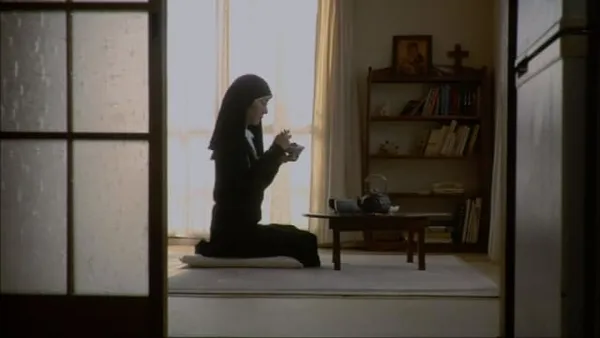Eye For Film >> Movies >> Autumn Adagio (2009) Film Review
Autumn Adagio
Reviewed by: Paul Griffiths

Mariko is a diligent nun leading a cloistered life in every way. Whether playing the organ dolefully or preparing meals for one, her dulled eyes and demeanour show a person near hypnotised by religious servitude and ritual. The passage of time, though, is beginning to weigh on her thoughts.
She is almost unaware of her inner disquiet until she overhears some parishioners discussing their own family and age problems. Struggling silently with the menopause, Mariko is gradually forced to question the life she has devoted herself to and what it has asked her to sacrifice.

It is only after she reluctantly agrees to play piano at a ballet class that she starts to rediscover some of her emotional grammar. When the instructor asks that she invest herself more in her playing she finds a channel to begin tentatively exploring and expressing her feelings. Her priest then charges her with an errand that will become entwined with her gentle, hidden turbulence.
A nun quizzing her chastity, expressing sexuality, the stuff of many a sleaze and exploitation flick, but Tsuki Inoue’s fine debut feature could not be more different. Autumn Adagio approaches the deeply personal with respect and penetrating sensitivity, not just for Mariko’s calling, but for the human understanding it fathoms. It is occasionally a profoundly moving film.
Much rests on Inoue’s clear skill at visually conveying the inexpressible and the ballet trope is one such example. The scenes where Mariko observes two professional dancers practising, or when she plays passionately for the instructor, are graceful, enduring and erotically sorrowful. Inoue’s imagery is less even-handed at other times, but she measures a consistent pace and tone. Her HD camera captures a subdued palette, with earthy tones varying from green fecundity to aging browns. The elemental and seasonal motifs further foster Mariko’s entering the autumnal years of her life.
Rei Shibakusa’s performance is necessarily one of remarkable restraint. She avoids theatrics to reveal Mariko’s understated emotions and discomposure and, one feels, benefits from some clear, comprehensive direction from Inoue. As well as directing, Inoue multi-tasked as writer, producer and editor. A financial necessity maybe, but perhaps this afforded her the level of personal control needed to realise her vision with such consideration. Without it, her Adagio might have seemed a very slight, ill-judged piece that only hit half its notes. As it is, the film is by turns moving, disturbing, tragic and beautiful.
Reviewed on: 11 Oct 2010

















